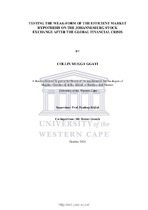| dc.contributor.advisor | Brijlal, Pradeep | |
| dc.contributor.author | Ggayi, Collin Mugga | |
| dc.date.accessioned | 2022-02-24T13:35:52Z | |
| dc.date.available | 2022-02-24T13:35:52Z | |
| dc.date.issued | 2021 | |
| dc.identifier.uri | http://hdl.handle.net/11394/8746 | |
| dc.description | Magister Commercii - MCom | en_US |
| dc.description.abstract | The efficient market hypothesis (EMH) is a controversial theory in Finance.
Advocates of the EMH argue that it provides a basis for understanding financial
markets while critics suggest that the hypothesis is unreasonable in its assumptions
of the real function of these markets. Although the EMH may not be perfect, it
provides a sufficient baseline against which financial markets may be analysed.
Over the past couple of years, academics have broadly examined the EMH in both
developing and developed financial markets. However, limited research has been
done on African markets. Therefore, this study examines the weak-form EMH of
the Johannesburg Stock Exchange (JSE) after 2008 to ascertain the impact the 2008
global financial crisis had on its efficiency. This study analysed the JSE using
weekly and monthly returns of the three major indices (RESI 10, FINI 15, INDI 25)
as well as the individual companies under these indices from 30th January 2009 to
30th January 2019. Analysis was carried using various statistical tests i.e., runs test,
variance ratio test, unit root tests, and a GARCH model which revealed mixed
results.
Results of the unit root tests (ADF and PP) confirm that the JSE is weak-form
efficient when both the weekly and monthly data of the indices and individual
companies are analysed. The results of the runs test reveal that all the weekly and
monthly data apart from the weekly data of the companies under RESI 10 index
exhibit weak-form efficiency. The variance ratio test confirms weak-form
inefficiency when weekly data is used while the monthly data confirms weak form efficiency of the JSE and shows that the market moves from periods of efficiency
to periods of relative predictability. The results of the GARCH model on the other
hand confirm the weak-form efficiency of the JSE when both the weekly and
monthly data of the indices are analysed. | en_US |
| dc.language.iso | en | en_US |
| dc.publisher | University of the Western Cape | en_US |
| dc.subject | Efficient Market hypothesis | en_US |
| dc.subject | Global financial crisis | en_US |
| dc.subject | Johannesburg Stock Exchange | en_US |
| dc.subject | Random walk | en_US |
| dc.subject | Market efficiency | en_US |
| dc.title | Testing the weak-form of the efficient market hypothesis on the Johannesburg stock exchange after the global financial crisis | en_US |
| dc.rights.holder | University of the Western Cape | en_US |

